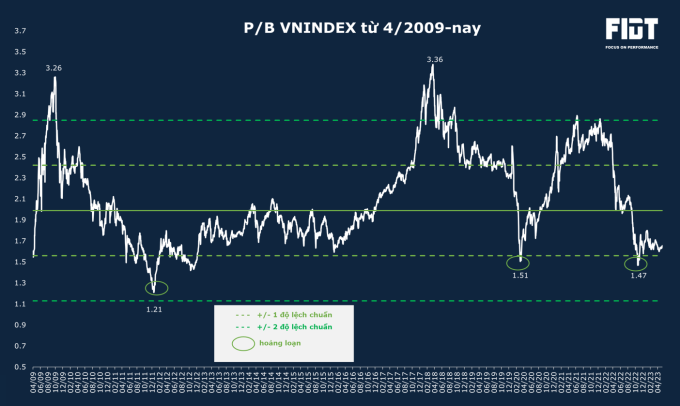Experts advise that if you have enough reserve funds, investing in stocks periodically is a suitable strategy for young people now and in the next few years.
I am a 26-year-old female, single, and have been working for two years. In addition to my main job, which earns about 10 million VND per month, I have an additional income of 9 million VND. I live with my parents, so each month I only help pay for my younger sister's tuition and my own expenses. Therefore, each month, I have more than 5 million VND left over.
Currently, I have saved some money, including: 100 million in savings, 18 million invested in a stock code that is making a slight profit. I would like to ask for expert advice on the following 3 plans.
Firstly, I can save about 30 million VND more in the near future, and I want to continue investing in long-term stocks (focusing only on 1-3 codes, including the codes I own) and long-term fund certificates.
Second, of the remaining 5 million VND each month, I plan to allocate 1.5 million to fund certificates, 1 million to stock investments, 1.5 million to online savings, and 1 million to reserve for unexpected expenses.
Third, the company usually pays salary every few months, so after each payment, I have an additional amount of 30-50 million VND. I don't know whether to invest that money in land, gold, stocks or continue to save.
Nguyen Thi Cuc

Customers are trading stocks at a headquarters on Pasteur Street, District 1, January 2020. Photo: Quynh Tran
Consultant:
First, based on the information you provided, I have some initial comments on your personal finances as follows. Your salary income is still long (because you have just graduated from school for two years, and will work for a long time in the labor market) and has a lot of potential for income growth. Therefore, you can allocate more to assets with high volatility but higher returns such as stocks, or in the case of larger capital, real estate.
You have a steady source of surplus income even though the company often pays unevenly. In the long term, you will have surplus income of 5-10 million VND per month.
In addition, you also have a reserve fund, which is 100 million VND in savings in the form of bank deposits. Normally, the reserve fund will be equivalent to 3-6 months of spending (about 15-25 million VND for current spending). This level will depend on whether you have financial protection products or not. This fund needs to be increased to more than 6 months of spending if in the next 2-3 years, you are the main source of income for the family and your parents do not have a pension or insurance. If your parents are less dependent on you for at least the next 3-5 years and they also have a pension or insurance, I consider the savings of 100 million VND to be enough for a reserve.
With the above analysis, I recommend that you do not need to increase too much in reserves (deposits) unless you fall into the above cases or periods of high savings interest rates (can apply at 8.8% or more for a 12-month term, often accompanied by bad market periods).
When human capital is long in the future and there is a steady surplus with low numbers, periodic stock investment is a suitable strategy for you now and for the next few years.
With the first amount of money, 30 million VND (different from the 5 million VND monthly), I recommend continuing to invest in the assets you have. Because I do not know the portfolio you are allocating, I suggest a general allocation of 3 capital injections (10 million each time) and each purchase at least 1 month apart.
You should prioritize buying during market corrections or stocks that you want to buy during corrections. In addition, you can also prioritize this time to increase the balance of your portfolio. For example, if your portfolio has a certain code that is relatively less valuable than other codes, you should buy more when allocating this amount to help balance the portfolio.
Regarding the 5 million VND per month, I think it should not be allocated too fragmentedly as you suggested. The online savings account both generates interest and is considered a reserve (because you can withdraw online savings immediately, the liquidity is almost equivalent to cash). Therefore, if you do not fall into a situation where you have dependents, the additional reserve is not necessary.
Instead of dividing, you can allocate 5 million to investment accounts (fund certificates and individual stocks). Accordingly, you can invest 2.5 million in a fund every month and the remaining 2.5 million in individual stocks. This does not need to be too rigid and can be allocated this month to prioritize funds, next month to prioritize stocks because 2.5 million VND is difficult to buy a lot of 100 stocks in the current market. Allocation to individual stocks or funds depends on how well you understand the market and how much you know about the business that is accumulating assets. If your understanding is limited, I recommend a larger allocation to fund certificates.
Regarding the salary accumulated over many months of 30-50 million VND, similar to the 30 million you mentioned first, you should prioritize the stock market instead of other options. Real estate will be suitable at a later stage when you have accumulated enough and the active income from work is higher and more stable to be enough to pay for the periodic interest and principal payments when buying real estate.
In addition, the stock market is priced relatively cheap in history, quite suitable for accumulation in the current period. The chart of the market valuation P/B ratio of VN-Index below shows that the periods when the white line (market valuation) is below the solid blue line (average line) are when the market is priced cheap and suitable for long-term accumulation.

VN-Index's P/B ratio is below the average line, one of the signs that market valuation is cheap. Source: FIDT
Additionally, you can buy a small amount of gold (but not too much) every time you have a sudden income. This should be included in the reserve and savings you already have.
Huynh Hoang Phuong
Director of Investment Research and Analysis
at FIDT Investment Consulting and Asset Management Company
Source link





























![[Photo] National Assembly Chairman attends the seminar "Building and operating an international financial center and recommendations for Vietnam"](https://vphoto.vietnam.vn/thumb/1200x675/vietnam/resource/IMAGE/2025/7/28/76393436936e457db31ec84433289f72)







































































Comment (0)